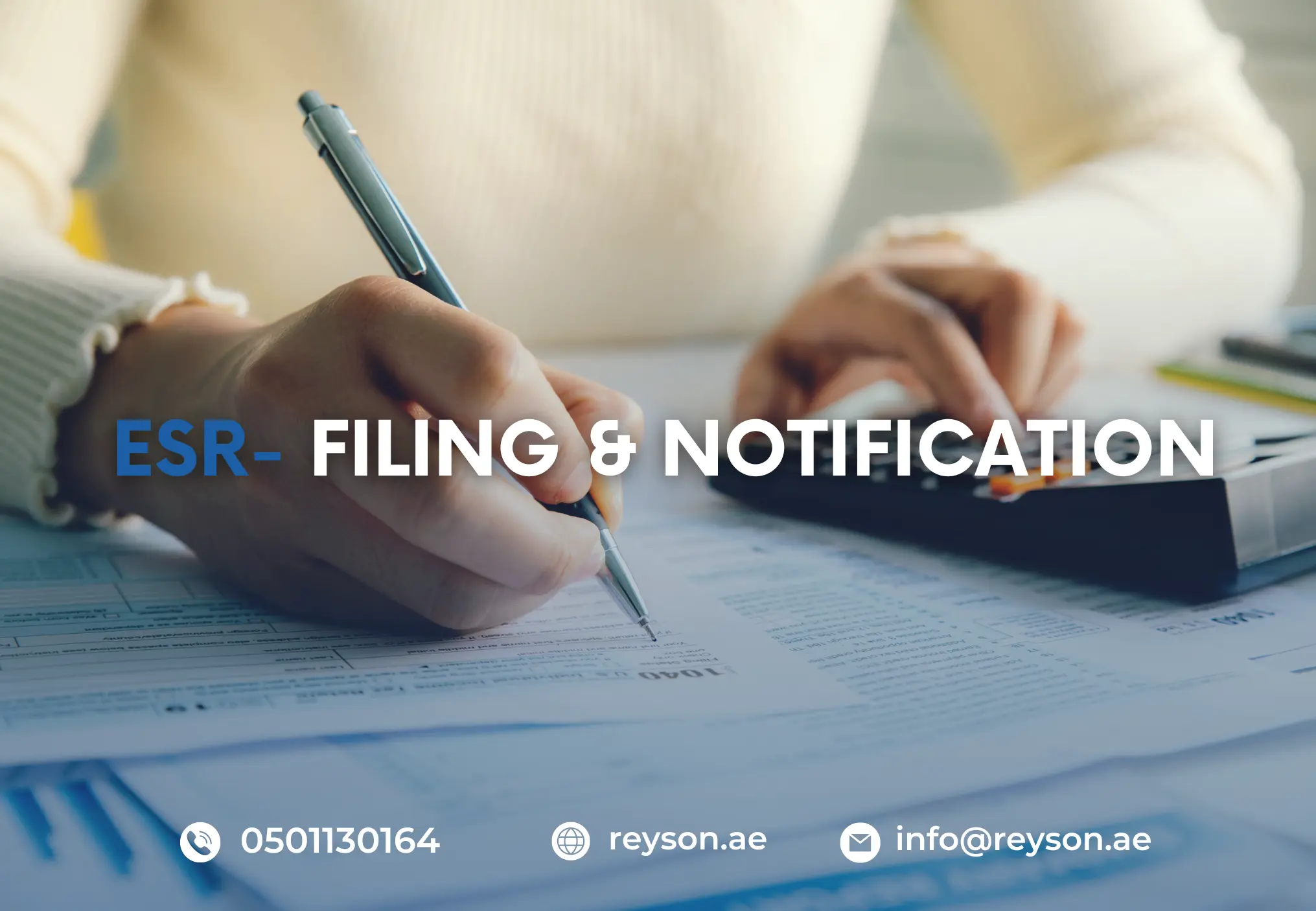
Economic Substance Regulations (ESR) in UAE are designed to ensure that companies engaging in specific business activities demonstrate substantial economic presence in the UAE. Implemented in response to global initiatives against tax avoidance, ESR mandates that UAE-based entities, including those in free zones, undertake defined "Relevant Activities" such as banking, insurance, investment fund management, and shipping, to meet certain substance requirements. These include management and operations conducted in the UAE, adequate expenditure, and physical presence, along with annual reporting obligations to the relevant authorities

To follow ESR, you need to know if it applies to what your business does. Then, you take steps to make sure you're following the rules. It doesn't matter if your business is big or small; understanding ESR can make a big difference in how well your business runs and stays on the right side of the law. Let's get into the details of ESR, from understanding the basics to finding ways to meet the rules. It will help your business grow while staying legal and competitive.
It is a formal declaration that entities must submit to confirm whether they engage in any relevant activities covered under the Economic Substance Regulations (ESR). This notification is essential for compliance with UAE's economic substance laws, which are designed to ensure that entities conducting certain types of business within the UAE have a genuine economic presence in the country.
To tell the UAE Ministry of Finance (MoF) about Economic Substance Regulations (ESR), you usually do it online through their website. Here's how it works
Doing this keeps your company following the rules for ESR in the UAE.
Businesses are required to submit their ESR (Economic Substance Regulations) Notification within six months from the end of their financial year. This submission ensures that the relevant activities undertaken by the business are reported in accordance with the regulations.
Example
| Scenario | Details |
| Financial Year End | December 31, 2023 |
| Notification Deadline | June 30, 2024 (six months from the end of the FY) |
Here are the deadlines for ESR Notification
Every company in the UAE has to let the Ministry of Finance (MoF) know about their Economic Substance Regulations (ESR) status. This includes companies that don't have to send detailed ESR reports. Even if you're exempt from filing reports, you still need to tell the MoF about your ESR status by sending a notification. This helps the MoF keep track of all companies and make sure everyone follows the ESR rules, whether they have to file reports or not.
Yes, free zone companies in the UAE are subject to the notification requirements of the Economic Substance Regulations (ESR). Regardless of whether a company operates in a free zone or on the mainland, it must notify the UAE Ministry of Finance (MoF) about its ESR status. This notification process applies to all companies, including those located in free zones, to ensure compliance with ESR regulations across the board.
If a company in the UAE doesn't send its Economic Substance Regulations (ESR) notification on time or gives incorrect information, there can be serious consequences.
|
S. No |
Description of Violation |
Penalty Amount |
Timeframe to Apply the Penalty |
|
1 |
Failure to submit the notification (and any relevant information or documents) within six months from the end of the financial year, unless extended by the competent authority. |
AED 20,000 |
Six years from the date of committing the violation, unless due to fraud that prevented the National Assessing Authority from imposing the fine. |
|
2 |
a) Failure to submit the Economic Substance report (and any relevant information or documents) within twelve months from the end of the financial year, unless extended by the competent authority. b) Submission of a report within the legal period that does not meet the requirements of the Economic Substance Regulation in the UAE. |
AED 50,000 |
Six years from the date of committing the violation, unless due to fraud that prevented the National Assessing Authority from imposing the fine. |
|
3 |
During the subsequent fiscal year, repeatedly committing one of the two infractions listed in clause (2) of this schedule. |
AED 400,000 as well as any additional administrative action (such as the trade license being suspended, revoked, or not renewed). |
six years from the date of the infraction, unless the National Assessing Authority was unable to impose the fine because of fraud. |
|
4 |
knowingly giving false information regarding the Economic Substance Regulation or neglecting to alert the National Assessing Authority or the regulating body of the mistake after it has been submitted. |
AED 50,000 |
Twelve months after the National Assessing Authority learned of the infraction, unless fraud prohibited the NAA from imposing the penalty in that time frame. |
It's really important for companies to stick to the ESR notification deadlines and give correct information. Getting help from legal or financial experts can make sure everything is done right and avoid these problems.
Refers to the requirement for entities engaged in relevant activities to submit reports demonstrating compliance with the Economic Substance Regulations (ESR). These regulations ensure that companies conducting certain activities within the UAE have substantial economic presence and are not merely established for tax avoidance purposes.
To submit an ESR report electronically through the Ministry of Finance (MoF) portal, follow these steps:
Relevant Activities: Your business needs to do certain types of work like banking, insurance, leasing, managing funds, shipping, providing services from headquarters, managing intellectual property, selling goods, or managing investments.
"Relevant activities" are specific things that businesses do that make them have to follow Economic Substance Regulations (ESR) in the UAE. These activities are decided by the UAE Ministry of Finance (MoF) and include:
Businesses might not have to do ESR filing if they
By doing these things, your business stays on the right side of the law, avoiding penalties or problems. Keep checking for any new rules or changes from the MoF to stay compliant.
Here is a more detailed overview on ESR Filing Criteria in UAE
Having these documents ready and organized helps your business report its activities correctly and show it's following the rules.
To have a more-detailed overview on the documents required for ESR filing, check out here.
Free zone companies in the UAE follow Economic Substance Regulations (ESR) if they do relevant activities Listed by the UAE Ministry of Finance (MoF). This relevent activities includes things like banking, insurance, leasing, managing funds, shipping, dealing with intellectual property, selling goods, or managing investments.
But, how these rules apply to free zone companies might be a bit different from compared to mainland companies. Some free zones may have their own rules about ESR filing that companies in those zones must follow. These rules might be about how to report, when to submit reports, and what exactly companies need to do to follow the rules.
It's really important for free zone companies to talk to the people in charge of their free zone and legal experts to understand exactly what they need to do for ESR Reporting. This way, they can make sure they're doing everything right according to the rules of their free zone.
Mainland companies in the UAE have to follow Economic Substance Regulations (ESR) if they engage in relevant activities listed under the UAE Ministry of Finance (MoF). These relevant activities includes things like banking, insurance, leasing, managing funds, shipping, dealing with intellectual property, selling goods, or managing investments.
These companies should check if their activities fall under relevant activities that require ESR filing. If they do, they need to follow the ESR rules, which means submitting reports on time as per the MoF's guidelines.
Businesses must submit their ESR report within 12 months after the end of their financial year if they carry out relevant activities. This deadline is mandated to verify that businesses comply with economic substance requirements.Reports should be filed through the Federal Tax Authority (FTA) online portal.
Example:
| Scenario | Details |
| Financial Year End | December 31, 2023 |
| Report Deadline | December 31, 2024 (12 months from the end of the FY) |
The exact deadline can change based on the situation of each business and any new rules from the UAE Ministry of Finance (MoF).
ESR Non-Filing Penalty
Not following the rules for Economic Substance Regulations (ESR) in the UAE can lead to big fines and other problems for companies. If a company doesn't send its ESR report on time:
If you get a penalty for not sending the right documents under Economic Substance Regulations (ESR) in the UAE, here's what you can do to appeal it. First, read the penalty notice carefully from the UAE Ministry of Finance (MoF) to know why you got the penalty and when you can appeal. Gather proof like emails, documents you tried to send, and your financial records to show your side. Write a letter to the MoF explaining why you think the penalty is unfair or should be less, and include your proof. Send this letter in time through the right channels, and check to make sure they got it. Then, wait for their decision, which could be keeping, reducing, or canceling the penalty. Follow what they say and any rules they set. It's a good idea to get help from legal experts to guide you through this process.
Dubai enterprises should be aware of the serious consequences of failing to comply with Economic Substance Regulations. Here's the breakdown:
Financial Penalties
Operational disruptions
Legal consequences
Practical issues
Helping businesses with Economic Substance Regulations (ESR) in the UAE is something experts like Reyson Badger are really good at. They help to fill out the right forms and gather all the needed financial and operational info to make sure everything is correct. They make sure companies send their ESR Notification Services on time and follow all the rules. They also help with ESR Reporting Services to the relevant authorities. Reyson Badger also gives advice on how companies can do better with their economic substance, manage risks, and handle any problems with following the rules. If there are audits or questions about ESR, they are there to help and make sure companies are ready and doing things the right way.